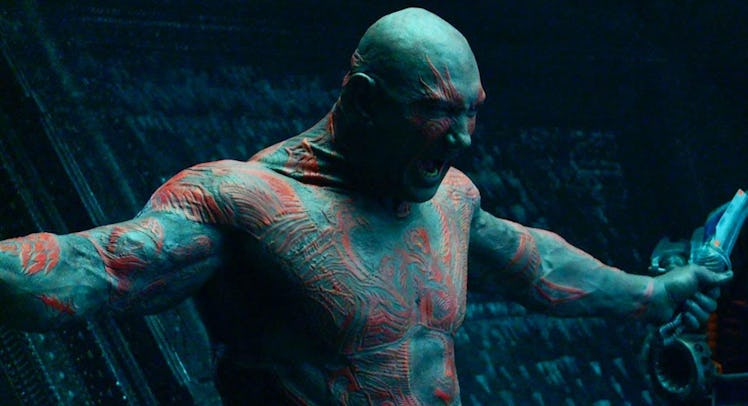Drax The Destroyer Is The Hero The Autistic Community Deserves
Michael Precourt, former film reviewer for The Autism Channel, explains.

In the last few years, there has been an increasing number of Hollywood films that portray characters who may be — or explicitly are — on the Autism spectrum. Some of recent examples include Academy Award-winner The Big Short, last year’s surprise hit The Accountant, and the rebooted Power Rangers. But there’s another film franchise that resonates with the Autistic community: Guardians of the Galaxy. Why? Because of Drax the Destroyer.
Ignore the “Destroyer” part of Drax’s title, which he got by laying waste to the minions of the first film’s villain, Ronan the Accuser. When you really think about the traits that make Drax unique in a cast that includes a talking raccoon with a machine gun and a giant tree creature whose only speech is “I am Groot”, you’ll find he has many that align him with the Autism spectrum. This is why he’s become sort of a hero to the Autistic community.
Let’s start with the most obvious trait: Drax doesn’t understand metaphors. He takes everything literally. An example of this is when Star-Lord puts his finger to his throat as a symbol of wanting to kill Ronan, Drax asks Star-Lord, “Why would I put my finger on his throat?” Even when Rocket Raccoon explains that Drax and his people don’t understand metaphors and that they “are gonna go over his head”, Drax’s immediate response is arguably his most famous line: “Nothing goes over my head. My reflexes are too fast. I will catch it.”
This leads into another of Drax’s traits that could be attributed to Autism: He is extremely defensive over what he is and isn’t. Right before Rocket explains Drax’s way of thinking to Star-Lord, Star-Lord calls Drax a walking thesaurus. Drax tells Quill, “Do not ever call me a thesaurus.” It’s debatable whether Drax even knows what a thesaurus is, but he certainly knows he is not one. Later, he shouts at Gamora that he is “not a princess”, even though it has nothing to do with what Gamora is saying. Drax knows exactly what he is, and that is Drax. He is not a princess, or a thesaurus, walking or otherwise.
He is Drax and he doesn’t like being called anything else.
Drax is also very blunt and quick to speak his mind, as many children and adults on the Autism spectrum often are. In a pivotal scene in Vol 1., Drax is quick to apologize to Rocket and Groot for calling Ronan to Knowhere, which resulted in the capture of Star-Lord and Gamora by the Ravagers. Then, shortly before the final battle, Drax takes a moment to express his appreciation to his companions for their acceptance of him, despite his numerous shortcomings. When he does this, he’s still very literal, calling Groot a “dumb tree” and Gamora a “green whore.”
Finally, Drax is incredibly fixated on a specific goal. Throughout the first film, his sole mission is to avenge the deaths of his wife and daughter, both of whom were killed by Ronan. And, after Drax finally completes this goal when he and the rest of the Guardians save the planet Xandar and destroy Ronan, he still acknowledges that Ronan, the very being who killed his family and laughed over their corpses, was just a puppet and expresses a desire to kill Thanos, the antagonist of the Marvel Cinematic Universe. Drax is so fixated on his goal that even when he achieves it, he feels he is compelled to do it all over again.
But one of the great things about Drax is that he is a dynamic character, one who grows throughout the course of the story and changes as a person (or, alien). By the end of the first film, Drax has already made up for his blunders, accepted his friends as they have accepted him, and even learned to understand metaphors — upon dispatching Korath the Pursuer (what is with this movie and giving its character’s titles?) he proudly shouts: “Finger to the throat means death!”
Is Drax a purposely Autistic character? Who knows. But he at least has many traits associated with Autism. And despite being called “The Destroyer” by many, he is actually a very good role model for people on the spectrum. He works to overcome his shortcomings as all great characters do. He also accepts those who don’t think the same way he does, is ready and willing to defend his friends, and has a very kind heart. In a cast where every hero has more than a few quirks and issues, it’s easy to see why Drax has become a fan favorite in the Autistic community.
Michael Precourt is a screenwriter and former film critic for Private Screening on The Autism Channel who is on the Autism spectrum. His first loves are movies and Autism, and his life’s mission is to enhance both in the modern world.
This article was originally published on